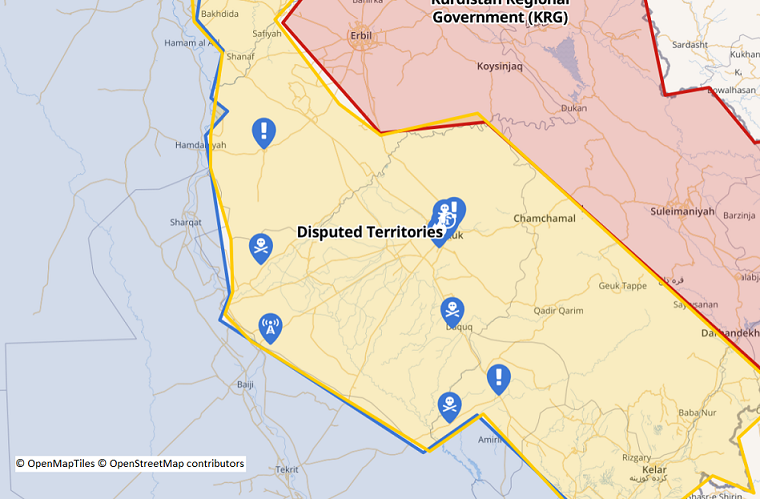1.2K
Kirkuk
- ISIS (Da’esh) terrorists launched multiple attacks in Kirkuk Governorate’s Hawija district and all other “disputed territories” last week. On Saturday, June 19, an IED near Daquq district injured at least three Iraqi soldiers patrolling the area. Daquq has seen daily attacks and kidnappings, resulting in six villages being vacated. In Kirkuk city, an IED wounded a civilian near al Khadra bridge on Tuesday. In western Hawija, six members of the occupying Iraqi federal police were injured after Da’esh attacked a security checkpoint near Tel al Khadeja village. The terror group attacked Kirkuk’s infrastructure, blowing up four power towers in Kirkuk, Diyala, and Tikrit last week.
- On Saturday, Kirkuk’s integrity court issued arrest warrants against former provincial council speaker, Rebwar Talabani and two provincial council members for lacking the compilation of “clean slate,” including keeping government vehicles. The court’s decision has been seen as political since the former speaker supported the independence referendum held by Kurds on September 25, 2017 and legal decision to raise the Kurdistan flag alongside the Iraqi flag on government building. Iraq’s provincial councils in were dissolved in December of 2019.
- Kirkuk continues facing a severe lack of basic service, including the accumulation of waste across the province. Jamal Shkur, Kirkuk’s lawmaker, said that the acting governor of Kirkuk Rakan Saed is facing 62 corruption cases for the mismanagement of government funds.
- Animal rights activists protested the killing of stray dogs by the police. In two days, Kirkuk police killed 550 stray dogs, but pressure from animal rights organizations reversed the administration’s decision.
- Iraq’s Prime Minister plans to create “peace and coexistence” committees in four provinces, including Kirkuk, Nineveh, Dyala, and Saldin. Kirkuk’s committee members are supposed to include four members to each Kurds and Arab, three Turkmen, and one Christian. Kadhimi’s initiative aims to decrease sectarian and ethnic tensions. However, Kurds in Kirkuk remain under immense pressure, and Arabs and Turkmen have replaced at least 120 Kurdish officials by Baghdad.
Khanaqin
- As water shortages remain a significant challenge in the town of Khanaqin, the water department in decided to drill 50 new wells to overcome the issue. The water shortage in Khanaqin is due to drought and Iran cutting water supplies to the Sirwan and Alwand rivers.
- According to security sources, Da’esh terrorists reaching out to several Arab tribal leaders to gain support as the terror group has stopped attacks in the area and shifted its focus to the Hamrin mountains instead.
Tuz Khurmatu
- As members of the Independent High Electoral Commission (IHEC) were replaced, tension arose between Turkmen and parties. The Turkish-backed Turkmen front bashed the new IHEC members and described the appointment as “Arab dominated” while the Arab parties accused the Turkmen party of creating issues “everywhere.” The parliamentary election is set to be held on October 10, 2021 however, political and security issues may result in its postponement. Following the events of October 16, 2017, Baghdad removed the Kurdish mayor and both Shia Turkmen and Sunni Arabs are now dominant powers in the disputed town.
- On Tuesday, June 22, Da’esh launched a three pronged attack on Sunni factions of the Popular Mobilization Units (PMU) and Iraqi Army, resulting in the death of two members of the Sunni milita members and the injury of four Iraqi soldiers. The attack took place south of Tuz Khurmatu between Sulayman Beg sub-district and Yangija village.
Makhmour
- After repeated threats by Turkey to invade the UN sponsored refugee camp in Makhmour, locals and camp residents held a protest on Tuesday. Protesters called on the government to protect the refugees from Turkish aggression. Turkey has launched several airstrikes on the camp since 2017.
Shingal
- Competing over one quota seat in the Iraq Parliament, Yezidis have six candidates in the upcoming elections. Political division among the Yazidi community has increased significantly following the liberation of their areas after suffering genocide at the hands of Da’esh terrorists. The Yazidi candidates include two independent candidates as well as four candidates from Kurdish, Sunni, and Shia parties. The town has seen intense political and security competition while at the same time it suffers from a lack of basic services.

